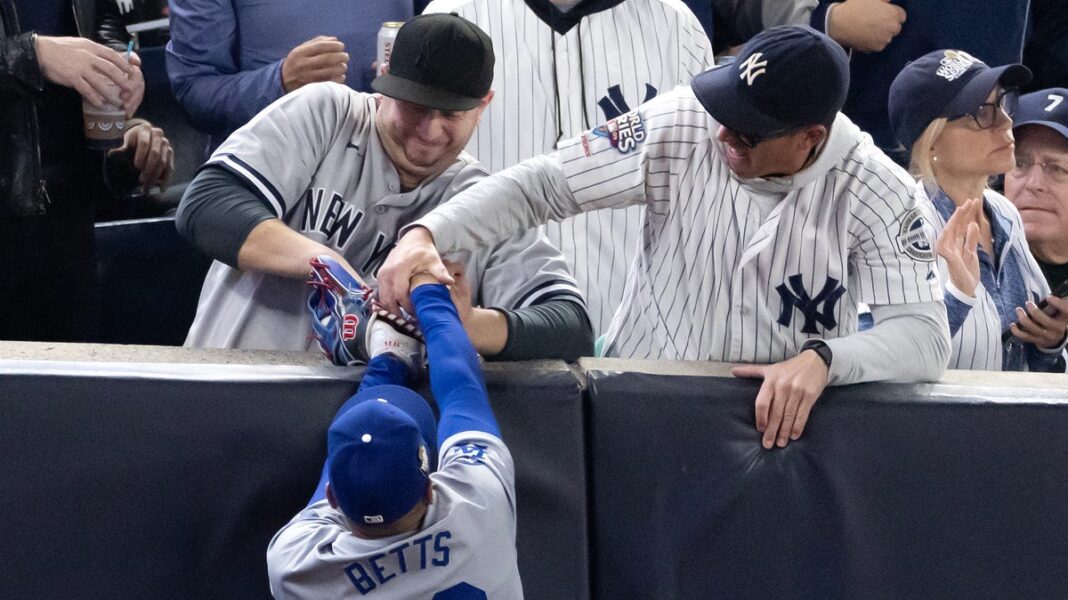Are High Game Tickets Driving Bad Fan Behavior?
The World Series may be over, but a controversial moment from Game 4 is still causing a buzz.
Two New York Yankees fans were booted from the game for interfering with Los Angeles Dodgers outfielder Mookie Betts by taking the ball out of his glove during a spectacular catch near their seats. They were also banned from attending Game 5.
“What happened might be a new record for fan behavior,” Daniel Wann, a psychology professor at Murray State University who studies sports fandom, told YSL News. “But this isn’t something that happened overnight.”
This isn’t just about fans grabbing baseballs or celebrating in ways that cross the line. There have been many incidents of fan interference and questionable behavior at sporting events.
During World Series Game 4, before the Betts incident, a fan interrupted a Stand Up to Cancer moment of silence to heckle Dodgers player Freddie Freeman. In 2021, a Celtics fan was arrested after throwing a water bottle at former Boston player Kyrie Irving during an NBA playoff game. At another 2021 NBA playoff game, a fan was permanently banned and lost his season tickets after dumping popcorn on then-Washington Wizards guard Russell Westbrook.
Are High Ticket Prices a Deterring Factor?
Culture shifts and costly tickets might be changing how people behave.
“People seem to feel more comfortable acting rudely and disrespectfully,” said Harvey Milkman, professor emeritus of psychology at Metropolitan State University of Denver.
Fans might be willing to shell out hundreds or even thousands of dollars for tickets, but the high price tag isn’t stopping them from acting out.
In 2023, the average cost of NFL game tickets climbed 8.6%, and MLB ticket prices increased by 3.5%, according to Team Marketing Report, which publishes fan cost index reports for professional sports annually.
“You’d think that if you’re paying that much for a ticket, you wouldn’t want to do something that would get you thrown out of the game,” Wann said. “But once you’re inside the environment and caught up with other fans, you’re not thinking about the price of the ticket. You’re focused on the game.
The high cost could even have the opposite effect.
“If you’re willing to pay a premium price for something, you become even more invested in the outcome and your participation in it,” Milkman said. “For superfans, their team’s success and failures become a part of their identity, so if they invest a thousand dollars in a ticket, that investment amplifies their emotions.”
What’s Driving This Behavior?
There are many reasons why a fan might act violently or behave badly.
One factor is alcohol. “You can’t talk about this without acknowledging the impact of alcohol,” Wann said. “It can embolden people to do things they wouldn’t otherwise do.”
Another is the feeling of anonymity in a crowd. “Fans might feel they can’t be identified, so they act differently than they would on their own,” Wann said.
After his ejection from Game 4, one of the fans told ESPN, “We’re not going to go out of our way to attack. If it’s in our area, we’re going to ‘D’ up” – almost as if he was a Yankees player.
“For a lot of fans, sports are an extension of who they are,” Wann said. “When their team loses, it’s their loss. If a referee makes a bad call against them, they feel personally slighted, just like the players.”
Sports fandom can become a big part of a person’s identity.
“Fans are often ‘born into’ their sports teams, almost like they’re born into a religion or ethnic group,’ Milkman said. “They are so deeply identified with the teams, it’s as if they are part of it.”
Additionally, there has been a decline in identification with “more traditional support systems. People tend to cling more closely to things like sports teams “When they have fewer connections to more traditional and comforting areas of social and personal life, sports fandom can become more intense,” Milkman said.
Finally, the culture we live in places a heavy emphasis on winning.
“There used to be more acceptance of losing gracefully. But now, the culture values competition and winning at all costs, ” Milkman said. “From my perspective, this values the need to win above all else.”

